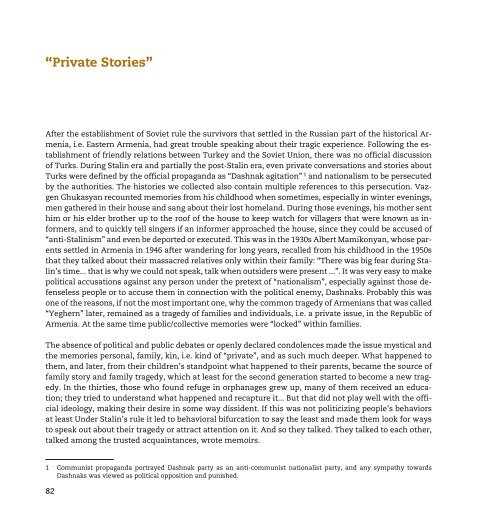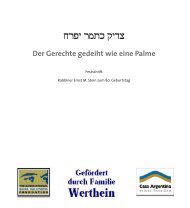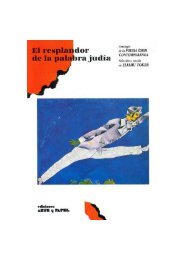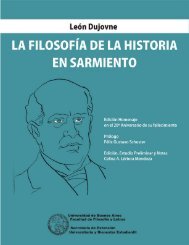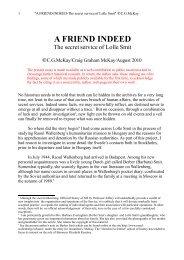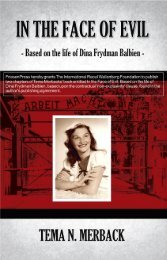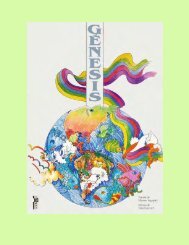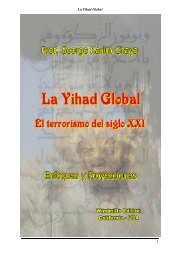Speaking to One Another - The International Raoul Wallenberg ...
Speaking to One Another - The International Raoul Wallenberg ...
Speaking to One Another - The International Raoul Wallenberg ...
- No tags were found...
Create successful ePaper yourself
Turn your PDF publications into a flip-book with our unique Google optimized e-Paper software.
“Private S<strong>to</strong>ries”After the establishment of Soviet rule the survivors that settled in the Russian part of the his<strong>to</strong>rical Armenia,i.e. Eastern Armenia, had great trouble speaking about their tragic experience. Following the establishmen<strong>to</strong>f friendly relations between Turkey and the Soviet Union, there was no official discussionof Turks. During Stalin era and partially the post-Stalin era, even private conversations and s<strong>to</strong>ries aboutTurks were defined by the official propaganda as “Dashnak agitation” 1 and nationalism <strong>to</strong> be persecutedby the authorities. <strong>The</strong> his<strong>to</strong>ries we collected also contain multiple references <strong>to</strong> this persecution. VazgenGhukasyan recounted memories from his childhood when sometimes, especially in winter evenings,men gathered in their house and sang about their lost homeland. During those evenings, his mother senthim or his elder brother up <strong>to</strong> the roof of the house <strong>to</strong> keep watch for villagers that were known as informers,and <strong>to</strong> quickly tell singers if an informer approached the house, since they could be accused of“anti-Stalinism” and even be deported or executed. This was in the 1930s Albert Mamikonyan, whose parentssettled in Armenia in 1946 after wandering for long years, recalled from his childhood in the 1950sthat they talked about their massacred relatives only within their family: “<strong>The</strong>re was big fear during Stalin’stime... that is why we could not speak, talk when outsiders were present ...”. It was very easy <strong>to</strong> makepolitical accusations against any person under the pretext of “nationalism”, especially against those defenselesspeople or <strong>to</strong> accuse them in connection with the political enemy, Dashnaks. Probably this wasone of the reasons, if not the most important one, why the common tragedy of Armenians that was called“Yeghern” later, remained as a tragedy of families and individuals, i.e. a private issue, in the Republic ofArmenia. At the same time public/collective memories were “locked” within families.<strong>The</strong> absence of political and public debates or openly declared condolences made the issue mystical andthe memories personal, family, kin, i.e. kind of “private”, and as such much deeper. What happened <strong>to</strong>them, and later, from their children’s standpoint what happened <strong>to</strong> their parents, became the source offamily s<strong>to</strong>ry and family tragedy, which at least for the second generation started <strong>to</strong> become a new tragedy.In the thirties, those who found refuge in orphanages grew up, many of them received an education;they tried <strong>to</strong> understand what happened and recapture it... But that did not play well with the officialideology, making their desire in some way dissident. If this was not politicizing people’s behaviorsat least Under Stalin’s rule it led <strong>to</strong> behavioral bifurcation <strong>to</strong> say the least and made them look for ways<strong>to</strong> speak out about their tragedy or attract attention on it. And so they talked. <strong>The</strong>y talked <strong>to</strong> each other,talked among the trusted acquaintances, wrote memoirs.1 Communist propaganda portrayed Dashnak party as an anti-communist nationalist party, and any sympathy <strong>to</strong>wardsDashnaks was viewed as political opposition and punished.82


